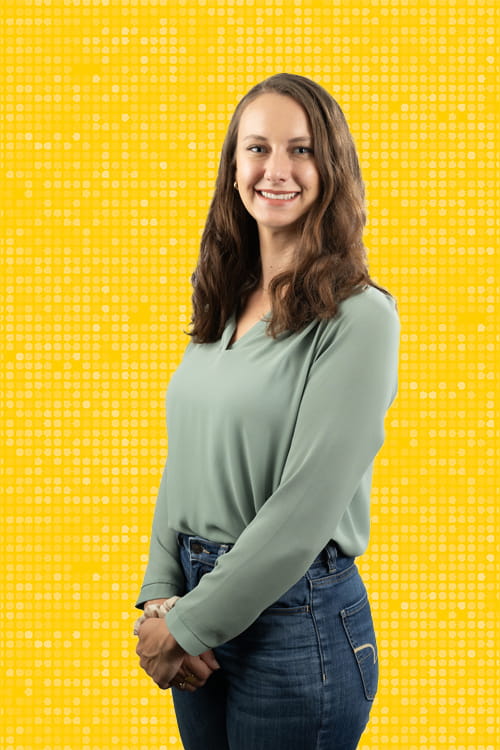
Samantha Kruse, PhD student, chemistry
Evaluates effects of radiation
“Her work in irradiation chemistry is a whole new area of study in my research group and she has led significant efforts to dive into this uncharted area.” -Tori Forbes, professor
Hometown: Waterloo, Illinois
Faculty mentor/advisor: Tori Forbes, PhD, professor, Department of Chemistry, College of Liberal Arts and Sciences
What is your degree program and anticipated graduation date? Chemistry PhD and graduation May 2025
Please describe your research: My research explores the effects of radiation, both UV and gamma radiation, on organic-based and uranium-containing materials. This allows us to explore trends associated with bond distance, bond strength, bond type, and packing within these materials which impact the material’s radiation resistance. In addition, we are able to understand the type and rate at which radicals, highly reactive species, form.
In simple terms, why does this research matter? Understanding the effects of radiation on organic-based materials is important for rationally engineering safer, more sustainable, less toxic, and cheaper radiation-resistant materials. These radiation-resistant materials can be used for solar cell coatings, space science, nuclear shielding, and radiomedicine. Understanding the effects of radiation on actinide-containing materials is important in the context of cleaner energy. Nuclear energy is a zero-carbon emission source, but we currently do not reprocess nuclear waste in the United States and simply store it. Understanding what reactive species form under different radiation types will allow scientists to effectively recycle the waste to reuse as an energy source, as well as store the waste safely since a lot of radiation is generated within the nuclear fuel and its waste.
How soon after starting at the University of Iowa were you able to participate in research? I started research my second semester in the Chemistry PhD program.
How has being involved in research made you more successful at the University of Iowa? The University of Iowa has opened me to many connections and collaborations I would otherwise not have. These connections span from industry, national labs, and other academic institutes. We have such a collaborative environment which cultivates impactful research to be done here on campus with other scientists throughout the country.
What are your career goals and/or plans after graduation? My plan after graduation is to be a postdoctoral scholar working on radiation chemistry of transuranic species involved in the nuclear fuel cycle. As for career goal, I would plan to seek professorship at a top university/institute where I can both continue my own research in radiation chemistry and the effects radiation has on actinides and organic materials, as well as teach and mentor the next generation of scientists.
Banner location: Downtown—
